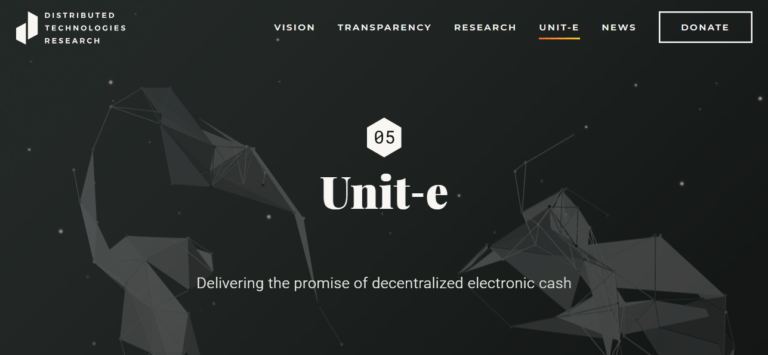Distributed Technologies Research (DTR), a Switzerland-based foundation that “funds innovative research”, has announced the launch of a new project called Unit-e, which is described as a “globally scalable decentralized payments system.”
Improving The Current “Blockchain Technology Stack”
The announcement’s press release states that DTR is funding research and development (R&D) to improve the “blockchain technology stack.” Similar to what most other blockchain-related R&D projects aim to achieve, DTR’s team of researchers want to develop a scalable cryptocurrency platform.
Commenting on the launch of the Unit-e initiative, Babak Dastmaltschi, the chairman of DTR’s foundation council, remarked:
The blockchain and digital currency markets are at an interesting crossroads, reminiscent of the inflection points reached when industries such as telecom and the internet were coming of age. These are transformative times. We are nearing the point where every person in the world is connected together. Advancements in distributed technologies will enable open networks, avoiding the need for centralized authorities. DTR was formed with the goal of enabling and supporting this revolution, and it is in this vein that we unveil Unit-e.
DTR has been established with the “belief that distributed trust will be at the core of our society”, the announcement noted. In order to improve the existing crypto ecosystem, DTR’s founders are planning on “promoting large-scale collaboration across industry and academia.”
Bringing Together Experts From Game Theory, Cryptography
The Swiss foundation will be bringing together experts from many different industries and disciplines. DTR’s team will reportedly include distributed storage specialists, information and communication theory researchers, game theory and incentive design analysts, and developers who are experienced in designing crypto-related software.
Explaining how the foundation plans to develop scalable cryptocurrencies, Giulia Fanti, a newly appointed researcher at DTR and an assistant professor of electrical and computer engineering at Carnegie Mellon University, said:
In the 10 years since Bitcoin first emerged, blockchains have developed from a novel idea to a field of academic research. Our approach is to first understand fundamental limits on blockchain performance, then to develop solutions that operate as close to these limits as possible, with results that are provable within a rigorous theoretical framework.
DTR’s research team reportedly consists of “tenured professors”, “award winners”, “patent holders”, highly skilled researchers, prolific authors, and distributed ledger technology (DLT) experts. This diverse multidisciplinary group will be tasked with “redesigning blockchains from the ground up with a first-principles, full-stack approach.”
Over 10 Research Papers Produced So Far
As a non-profit, DTR’s resources will mainly be used to support blockchain-related R&D efforts and towards helping the Unit-e “open-source developer community” in creating a scalable digital currency.
Pramod Viswanath, a researcher at DTR and professor of electrical and computer engineering at the University of Illinois Urbana-Champaign, revealed that the foundation’s research efforts have produced “over 10 papers so far, published (or under review) in peer-reviewed top scientific venues.”
Viswanath added:
Innovative research attracts top caliber academics to the collaboration, which further accelerates the pace of innovation.
Notably, research conducted by DTR will focus on creating a “holistic package” which will address “each layer of the blockchain technology stack: consensus, sharding, payment channels, privacy and security, and economics and incentives.”
Processing 10,000 Transactions Per Second
According to Bloomberg, DTR is planning to introduce Unit-e during the second half of the year. The third-generation cryptocurrency will reportedly process around 10,000 transactions per second (TPS).
Joey Krug, the co-chief investment officer (CIO) at Pantera Capital Management LP (which has invested in the Unit-e project), said:
The mainstream public is aware that these networks don’t scale.
As a member of the DTR council, Krug believes:
We are on the cusp of something where if this doesn’t scale relatively soon, it may be relegated to ideas that were nice but didn’t work in practice: more like 3D printing than the internet.








